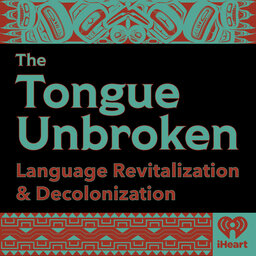Nanticoke Language: Bringing a Language Back
Tribal member Karelle Hall and linguist Keith Cunningham join to talk about their work with the Nanticoke Tribe in Millsboro, Delaware to revitalize their language, which had not been spoken since 1859. They talk about the work it takes to bring a language back, and the ways that collaboration and belief in overcoming genocide can help move back towards language use and strength. They also share ideas on what folks can do when they lose the last speaker of their language, and ways that people can contribute to language movements.
Follow Tongue Unbroken on social media at https://twitter.com/tongueunbroken, https://www.facebook.com/tongueunbroken, and http://tongueunbroken.com/
In 1 playlist(s)
Tongue Unbroken
The Tongue Unbroken (Tlél Wudakʼóodzi Ḵaa Lʼóotʼ) is a podcast about Native American language revita…Social links
Follow podcast
Recent clips

Coast to Coast: The Season Finale
1:00:07

Be the Change Agent of the Goal You Seek
55:51

Ḵúx̱de Kagux̱daháa: Landback, Languageback, Objectback
55:27
 Tongue Unbroken
Tongue Unbroken